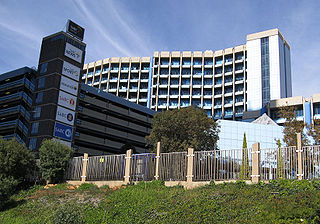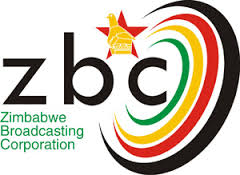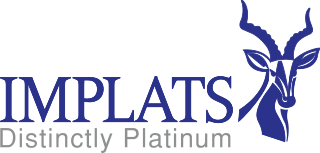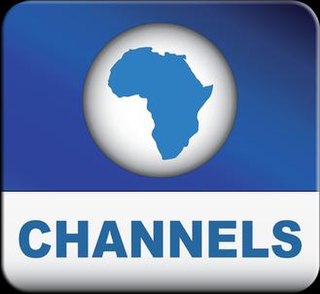
The economy of Zimbabwe is a gold standard based economy. Zimbabwe has a $44 billion dollar informal economy in PPP terms which translates to 64.1% of the total economy. Agriculture and mining largely contribute to exports. The economy is estimated to be at $73 billion at the end of 2023.
Communications in Zimbabwe refers to the communication services available in Zimbabwe.

Deutsche Welle, commonly shortened to DW, is a German public, state-owned international broadcaster funded by the German federal tax budget. The service is available in 32 languages. DW's satellite television service consists of channels in English, German, Spanish, Persian, and Arabic. The work of DW is regulated by the Deutsche Welle Act, stating that content is intended to be independent of government influence. DW is a member of the European Broadcasting Union (EBU).

The South African Broadcasting Corporation (SABC) is the public broadcaster in South Africa, and provides 19 radio stations (AM/FM) as well as six television broadcasts to the general public. It is one of the largest of South Africa's state-owned enterprises.

The Zimbabwe Broadcasting Corporation (ZBC) is the state-owned broadcaster in Zimbabwe. It was established as the Rhodesian Broadcasting Corporation (RBC), taking its current name in 1980. Like the RBC before it, the ZBC has been accused of being a government mouthpiece with no editorial independence.
Phillip Chiyangwa is a Zimbabwean politician who has served in the Zimbabwean government. His appointment as the head of Zimbabwe's football association led to controversy and he has been associated with various land disputes.
WILLOW is an American pay television sports channel which is completely devoted to airing overseas cricket events, including live and recorded matches and other cricket-related programming in English, with the majority of its advertising targeted towards the Indian subcontinent diaspora in North America. The network is carried both as a traditional subscription-television channel which airs on pay-TV providers, and a paid streaming service available online.

Algeria has more than 45 independent Arabic language and French language publications as well as 4 government-owned newspapers, but the government controls most printing presses and advertising. The Algerian newspapers with the largest circulations are Echourouk (1,800,000), Ennahar (1,600,000), El Khabar (1,000,000) and Quotidien d'Oran (700,000); all four are employee-owned. In 2004 and 2005, the government increased the access of Berber language and culture to both print and broadcast media.
Television is one of the most popular forms of media and information in Bangladesh. It was one of the first countries in South Asia to introduce television on 25 December 1964, in the then East Pakistan under the state-owned television network Pakistan Television Corporation in its capital, Dhaka. After the Bangladesh Liberation War in 1971, the Dhaka television station of PTV was renamed to Bangladesh Television, which had a monopoly on the country's television industry until 1997, with the launch of ATN Bangla on satellite television. Since then, the number of privately owned television channels saw a tremendous rise in the Bangladeshi television market.
Supa Collins Mandiwanzira is a Zimbabwean politician and journalist who served as the Minister of Information Communication Technology (2014-2017) and then Minister of Information Communication Technology and Cyber Security in the Cabinet of Zimbabwe from November 2017 to September 2018. His earlier portfolio had been merged with cybersecurity. He is a member of the Zanu-PF political party. He was the founder of the ZiFM Stereo radio station, and the online ZiTV station.
The media of Zimbabwe has varying amounts of control by successive governments, coming under tight restriction in recent years by the government of Robert Mugabe, particularly during the growing economic and political crisis in the country. The Zimbabwean constitution promotes freedom of the media and expression, however this is hampered by interference and the implementation of strict media laws. In its 2008 report, Reporters Without Borders ranked the Zimbabwean media as 151st out of 173.
Al-Aqsa TV is a television channel run by Hamas, which is based in the Gaza Strip. Its programs include news and propaganda promoting Hamas, children's shows, and religiously inspired entertainment. It is currently directed by Fathi Hamad, who is a member of the Palestinian Legislative Council and Interior Minister of the Gaza Strip. The channel is named after Al-Aqsa in Jerusalem.

Morgan Richard Tsvangirai was a Zimbabwean politician who was Prime Minister of Zimbabwe from 2009 to 2013. He was president of the Movement for Democratic Change, and later the Movement for Democratic Change – Tsvangirai (MDC–T), and a key figure in the opposition to former president Robert Mugabe.

Impala Platinum Holdings Limited or Implats is a South African holding company that owns several companies which operate mines that produce platinum and platinum group metals, as well as nickel, copper and cobalt. Its most significant mine is the Impala mine in the North West province of South Africa. The company also owns or has interest in the Two Rivers mine and the Marula mine in the South Africa Bushveld Igneous Complex and the Mimosa mine and Zimplats in Zimbabwe, as well as the Impala Refining Services which smelts and refines metals for other companies. In December 2019, Impala Canada was formed, owned by the holding company, out of the acquisition of North American Palladium and its mine in Ontario, Canada.
The mass media in South Sudan is underdeveloped compared to many other countries, including fellow East African states like Kenya, Tanzania, and Uganda. Poor transportation infrastructure and entrenched poverty in the country inhibit both the circulation of newspapers, particularly in states located far from the capital of Juba, and the ability of media outlets to maintain regular coverage of the entire country.

The mass media in Uganda includes print, television, radio and online sectors, and coverage is split between both state-run outlets and privately held outlets as well as English-language outlets and Luganda-language outlets.

Soul of the South Television is an African-American-focused regional broadcast network owned by SSN Media Group, LP. It primarily broadcasts in the Southern United States and secondarily in other high African-American populated cities in the north.

Channels Television is a Nigerian independent 24-hour news and media television channel based in Lagos, Nigeria. The parent company, Channels Incorporated, was founded in 1992, a year before the Nigerian government deregulated the broadcast media. It began broadcasting in 1995. Its primary focus is producing news and current affairs programs on Nigerian domestic issues. The Channel's mission is to act as a watchdog on governmental policies and activities.

The 2016–2017 Zimbabwe protests began in Zimbabwe on 6 July 2016. Thousands of Zimbabweans protested government repression, poor public services, high unemployment, widespread corruption and delays in civil servants receiving their salaries. A national strike, named "stay-away day," began on 6 July and subsequent protests took place across the country and diaspora.
This page is a timeline of social media. Major launches, milestones, and other major events are included.











